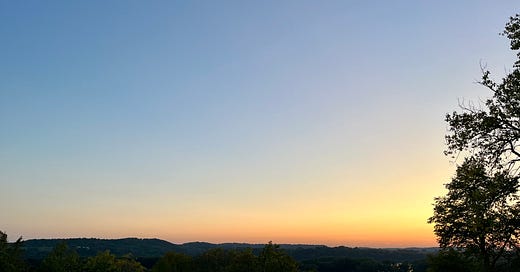More than a decade ago, having then recently moved to Chicago, I met a man we’ll call M. M was two decades older, a moody guy with a personality I liken to gravel: uneven and coarse but, in the right setting, kind of charming. The first summer I lived here, M invited me to a summer solstice party thrown by his neighbors in someone’s backyard, where we sat by a bonfire and drank batched mint juleps. M looked sullen, perhaps a little irritated. I asked him what was on his mind.
It’s the solstice, he told me. “From here on out, the days will get shorter. The end is on the horizon.”
I suppose I hadn’t thought about it that way before—that in the blossoming of summer when we’re all sipping cold drinks, splayed out in the grass, we can see the end on the horizon.
It’s now December 21st, the first official day of winter. While from today onward the days will get longer, I’m stuck on this word, horizon. The place where the sky meets the land, our field of vision; from horizein—to bound, define; from horos, a time, season. Such etymologies feel counter to the ceaselessness we feel during winter, where the only ‘binding’ one feels is in the actual daylight hours we get, and especially in Chicago, the limited hours of sunshine we’ll feel on our faces.
Again, I’m stuck on this word because when you experience horizon, looking outward at a vast expanse and seeing the big sky swallow everything until it meets the land, it doesn’t feel like a boundary. Instead, it feels like endlessness. I’m most jealous of those who live next to Lake Michigan during the winter when the sky and lake are both that blue-grey hue; standing on the coastline becomes like a visual sensory deprivation chamber where you float, suspended between the cold sky and pulsing water.
It comes as no surprise, then, that looking outward onto the horizon is a technique for stress relief. Andrew Huberman, a neuroscientist at Stanford University, studied how our eyes change in response to stress.
“The pupils dilate, and there’s a change in the position of the lens in the eye. Your visual system goes into the equivalent of portrait mode on a smartphone. Your field of vision narrows. You see one thing in sharper relief, and everything else becomes blurry. Your eyeballs rotate just slightly toward your nose, which sets your depth of field and focus on a single location,” he told Scientific American in 2020. It’s part of our primitive brain functions, he continued, one that then affects our peripheral nervous system, sending all those stress hormones into action.
We can help fix this, he said, by literally changing the way we view the world around us. Using ‘panoramic vision,’ focusing on the horizon and dilating our gaze to see both peripherally and take in what is above and below, “releases a mechanism in the brain stem involved in vigilance and arousal.”
This might be why going from busy downtown, with all these darn buildings blocking the horizon, to standing at the lake’s edge provides such a sense of calm. Lingering amid a Midwest prairie is a nervous system reset after staring at the computer for two months. Just for the sake of making it weirder, think about a black hole and its event horizon, the boundary on the edge of nothingness. One of my physics professors from undergrad told me that if you were to slowly reverse your 1987 Saab Turbo into a black hole, the horizon before you would narrow as all of the light in the entire universe condenses into a singular point. Sure, you’re descending into the unknown, but you’d be literally seeing to the beginning of time.
This is a long way of saying: Within endlessness there is relief.
This season, we’re keeping it casual: You’ll receive periodic stories about cities and landscapes in the wintertime, between December 21 and April. And, this year, we’re 100% independently funded. Please consider becoming a paid subscriber.





So glad to see this continue! Are paid subscriptions activated now?
Finally reading this in a moment when I have a breather. It is like sunshine inside my mind. Thank you!